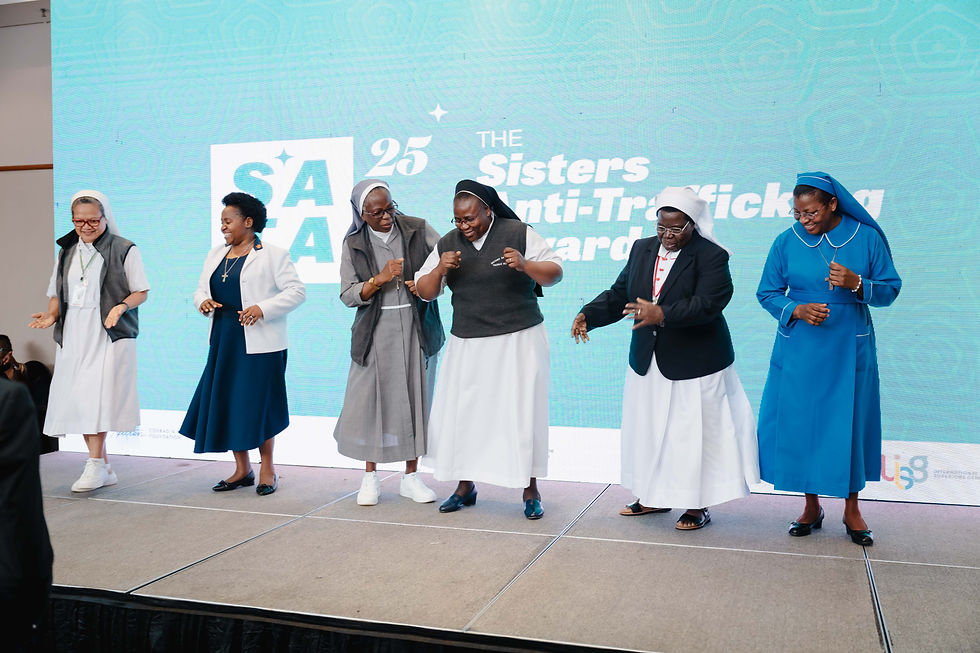If we're serious about ending slavery, we need to get serious about faith
- Arise

- Sep 30, 2018
- 3 min read
In the overwhelmingly non-religious worlds of the UN and government aid departments, there is still far too much ignorance of religion.
On a recent field visit to India’s southern city of Bengaluru, an unassuming looking woman stopped me on a street and asked: “What am I supposed to do with all the children?” Her searching, exhausted eyes had a serene authority that stopped me from walking away.
She was a Catholic sister named Mary Elise who recently played a central role in the rescue of 300 forced labourers – mostly children – in Bihar, northern India.
Three hundred children. That’s more than an average sized primary school.
As I found out later, she had won an award for it. But she wasn’t interested in talking about her achievements. She wanted to tell me that her organisation couldn’t deal with the numbers. There weren’t enough beds, school places, or counsellors to help them.
There was something hypnotic about this sister’s sense of purpose. As we talked I learned more about the daily difficulties she faces: scraping around for money to keep her work going; punishingly long hours; seemingly limitless bureaucracy; and the perilous risks she had faced including death threats and intimidation.
It was clear to me that I was in the presence of someone who had given everything to this cause. A true abolitionist.
Sister Mary Elise walks in a long a noble tradition of abolitionist sisters. Some have even paid for their commitment with their lives. On 21 February 2004 someone broke into the house of sister Doraci Erdinger in northern Mozambique, attacked her viciously and indiscriminately with a hammer, and strangled her.
Sister Doraci had dedicated her life to fighting organ trafficking, loudly and courageously denouncing local gangs which had been abducting and mutilating children to supply genitals and other body parts for ritual ‘Muti’ medicine.
There are many others. In 2013, sister Marie Emmanuel Helesbeux was murdered after 42 years of charity work in Madagascar. Sisters Lucia Pulici, Olga Raschietti, and Bernadetta Boggian were murdered in Burundi in 2017. Sisters Anselm, Margherit, Reginette and sister Judith were murdered in Yemen in 2016, to name just a few. Some died working against modern-day slavery. All died serving vulnerable communities.
This list barely scratches the surface, and comes nowhere close to capturing the global contribution of sisters to human rights and development. Of course, most aren’t killed. But nearly all spend decades quietly serving those in need.
Here’s the strange thing. The work of these courageous sisters is still viewed with suspicion in the development community. It’s the same for all faith-based charity work. There is a stubborn assumption that people of faith will only serve people of the same religion. Or that they simply won’t be able to offer help without trying to convert or proselytise.
Anyone who has seen the frontline effort of sisters knows this to be plain wrong. Yet still so many struggle to look beyond their faith to their extraordinary work.
It’s a major blindspot. More than 80 percent of the world is religious, so it follows that faith communities could be powerful cultural forces for good. More and more reports have been published demonstrating the critical role of religion in international development.
But there’s no real evidence that the policy community is listening. In the overwhelmingly non-religious worlds of the UN and government aid departments, there is still far too much ignorance of religion. And this leads to an inherent bias against it. Faith-based charities are at the back of the queue when grants are being handed out. Some bodies even exclude faith-based work as a matter of policy.
The effect is that the largest frontline forces in the world are far from realising their potential, and rarely given a platform.
The Arise Foundation isn’t a faith-based charity, but we see the contribution of these sisters and others like them for what it is: potentially game-changing. Just on its own, the global network of sisters working against slavery spans 80 countries.
These are workforces of thousands of activists, embedded in local, hard-to-reach communities. Workforces offering life-saving services and loving accompaniment. Workforces whose commitment is vocational and lifelong; and willing to give everything, like sister Doraci and sister Mary-Elise.
Working with them is an absolute no-brainer. If we are serious about ending slavery, we need to get serious about faith.
This piece, written by Arise’s Director Luke de Pulford, was published on Thomson Reuters Foundation News.
Click here to read the original.








Comments